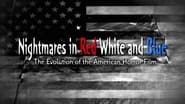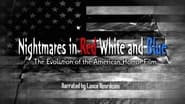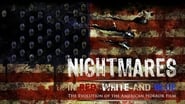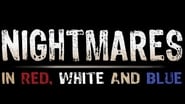VividSimon
Simply Perfect
Rijndri
Load of rubbish!!
Kailansorac
Clever, believable, and super fun to watch. It totally has replay value.
Kimball
Exactly the movie you think it is, but not the movie you want it to be.
zkonedog
When it comes to film-making, horror flicks have carved out quite a nice little existence for themselves. This documentary does two things: it reflects back on the history of the horror movie, as well as gives some reasons as to why they have evolved over the years.That first part, the reflection, is truly what carries "Nightmares in Red, White, and Blue". It is interesting to see the history of the genre, remembering all the terrifying (whether physically or emotionally) images that have branded themselves into our collective "film conscience".However, the "discussion" parts of the documentary leave much to be desired. The approach here is very political (in one laughable segment, former President Ronald Reagan is compared to Freddy Krueger!) and really tries to understand why the "Monster Era" of the early 1900s gave way to the aliens of the 50s, the slashers of the 80s, or the psychological thrillers of the 90s, for instance. While I appreciated the effort, the reasoning just seemed a bit ridiculous at times, almost as if the panel of guests were reaching for conclusions where perhaps none in fact exist.Overall, then, "Nightmares" is a great doc if all you care about is a history lesson on horror movies. If you want anything deeper, be prepared to take pretty much every comment with a grain of salt or that nagging feeling of "this is all just being trumped up to sell a genre".
suspiria56
Yet again we are fed the same old treatment for a new decade. (The American Nightmare treaded much the same ground previously). Watching this latest 'historic' instalment of how cinema's arguably finest and most effective genre came into fruition, feels like a retread, nothing new, nothing challenged. Granted the first half of the 20th century is covered with enthusiasm, but it is when contemporary American horror cinema is tackled does this documentary fall flat, with an approach almost like first year academia.However, John Carpenter makes a perfect point mid-way through in that we give directors like Craven (for Last House on the Left) too much credit by saying that films like Last House on the Left was pure social commentary. Or like Eli Roth's criminally over rated Hostel. These are not great social comments on America.Indeed, Last House on the Left is an excellent film, but it is an excellent exploitation film…and a film that can only be a product of its time - i.e. US cinema became more independent following the mid-60s boom, of which European cinema had been for many years. Before that, it had been controlled implicitly by a studio system. The horror genre will always thrive through independence.With Hostel, it is again a product of its time (okay it has trite, spoon feeding themes in it, but still…). It is a reaction to how desensitised audiences have become with the genre, a marketable push again by Hollywood studios to cash in on real issues - it's painful really, and a reason why the sludge of American horror cinema at the moment is truly woeful.Another point made here also was that the barrage of updates/remakes of 70s horror has become more gory and violent linked to events in the world ….don't give me that, it is purely that we are used to dumbed down violence, not just from news reports but by the need to shock and go one step further with what has previously been made, typified again by the US studio system (can you imagine a remake of Texas Chainsaw Massacre with no blood in it, ironically like the original - the studios wouldn't take the risk). The US studio system would remake anything if they could, but the marketable agenda is largely ignored. If the point was that these remakes reflected social ills, why is it that the slew of far Eastern horror, mainly from Korea and Japan, are tame versions of their original sources, not bloody, shocking versions. It is studio tactics, nothing more, nothing less. It is of no coincidence that the far Eastern originals are far superior, particularly as effective examples of the horror genre.Ultimately, the real depth to US contemporary horror was missed here again with this doc. We've heard the same trite academic stances before, over and over, with no counter argument. It is worth noting, and ignored in this documentary, that 70's US exploitation cinema is just as important in the history of the American horror film. Exploitation cinema exists outside of the studio system, away from franchises, pushing boundaries and normal expectations, much in the same way that there is a wealth of amazing European exploitation films (Italy, Germany and Spain being obvious sources of origin, yet many more beside). This brought to American cinema, certainly through the advent of the drive-in cinema and grindhouse picture house, a tidal wave of cinema free to explore any avenue, upping the ante of what audiences consumed.Despite its enthusiasm, and with the usual suspects (Carpenter, Romero, Dante et al) being interviewed, all this documentary really tells us is the historic arc of marketing the horror film….and for that motivation, misses the point entirely.
gavin6942
Horror and sci-fi veteran Lance Henriksen narrates this look at the history of the American horror film, examining the earliest monster movies of the silent era up to the scariest modern-day masterpieces. Highlights include interviews with genre masters Roger Corman, Joe Dante, John Carpenter and George A. Romero, plus clips from classic films like The Exorcist, Night of the Living Dead and Rosemary's Baby.I have seen my share of horror documentaries, I have read my share of interviews and interviewed my share of people in the horror industry. I have met most of the people in this documentary personally. So, my thought on this film going in was: this is going to be fun and a bit of a refresher for things I already know, a good thing to kick back and watch lazily. Nothing new to be learned here! Well, that may not have been completely true. While the film covered a lot of the same ground as things I was familiar with: the politics, the culture, how films of the 1950s reflected nuclear fears... the documentary had some new angles, too. Who thought we would see a horror documentary that brings in "Easy Rider" and the James Bond films? I never thought so.As I said, there is much talk of politics, particularly Reagan. Vietnam comes in, as does the Great Depression and the Cold War to a point. But the 1980s dominate, from John Carpenter's "They Live" to "American Psycho". There is even an argument made (which I find very dubious) that the 80s were a decade of excess, and this is in part why there is such an excess of blood in "Evil Dead 2". I doubt Sam Raimi would agree.Larry Cohen says early on, "If a horror film is cutting off people's thumbs and gouging your eyes out, I guess that's a certain of horror. But it's not the kind of horror film that interests me." I liked this distinction, because horror seems to be heading in the direction where more films are just violence without any fun, suspense or subtle message. And that is just cheap. Horror films may not win Oscars, but they still range from bad to good, and the best are more than just torture.The documentary also touched on numerous many overlooked films (such as "Atomic War Bride"), some that ought to have been overlooked ("Uncle Sam") and some lesser-known modern ones such as "The Devil's Backbone". The focus was on American films, so Hammer is not here, nor are the current foreign films of Japan. No Italian giallo. I think Vincent Price received far too little screen time, but overall the film covered just about every American film you could name that affected the history of horror in some way.
BC Kelly
Yes - a fine introduction to 'Horror' in American Film.But the singular use of the word 'Horror' does not do justice. Are many elements of Film Genres that cross over, and this Documentary gives tribute - so add Suspense, Thriller, Crime, Sci-Fi and all those other 'things' in Movies, Stories, and Tales that keep us on the edge of our seat, or huddled in fear around the campfire.Especially impressive is the Multi-Disciplinary approach. Movies and Stories don't exist in a vacuum, so factors of History and Culture are included to give further understanding of Society and how these Movies illuminate and/or reflect their Times. And although not directly mentioned, the Film does give tacit reference to Freud/Jung/Joseph Campbell's insights on Dreams, Archetypes and Myth - nothing you'd notice if you weren't aware of their work, but a taste to tease those who want to learn more.At the time of my posting are only 2 other reviews, with value in them both. Yes, a Ken Burns comparison is appropriate - has that Academic Quality. And yes, the 2000's as a decade may not measure up to those in the past. But this Film, at least in passing, does address that somewhat - plus, is difficult to write History as it's still evolving.Now, what is maybe the Greatest Thing™ ?All the Movies it tells us about, then gives the complete list, by Date, during the End Credits.Should keep you busy here at IMDb - and your 'video store' - for a while (smile)..







